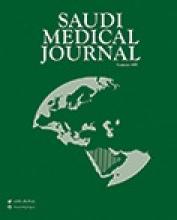Abstract
Objectives: To assess the correlation between a number of genetic variations of CYP2C19, TNF-α, NOD1, NOD2, and PPARγ genes with the severity of Helicobacter pylori (H. pylori) infections and peptic ulcers (PU).
Methods: A retrospective cross-sectional design was used in this study. Formalin-fixed paraffin-embedded (FFPE) tissue was used to extract genomic DNA that was collected from Jordanian patients who visited endoscopy clinics between 2014 to 2018 at the King Abdullah University Hospital (KAUH), Irbid, Jordan. Genotyping of the studied single nucleotide polymorphisms (SNPs) were applied using the sequencing protocol.
Results: A total of 251 patients (mean age: 42.12 ± 16.09 years) and healthy controls (mean age: 52.76 ± 19.45 years) were enrolled in this study. This study showed no significant association between patients and the studied polymorphisms except for rs2075820 of the NOD1 (p=0.0046). It is hypothesized that the heterozygous genotype (TC); 44.8% in patients versus 61.3% in controls has a decreased risk of peptic ulcers (OR: 0.49). The alleles frequency association was insignificant in all studied SNPs with a p-value more than 0.05.
Conclusion: This study provided evidence regarding the association of the rs2075820 with H. pylori infections. The other studied SNPs were not statistically significant.
- Helicobacter pylori
- peptic ulcers
- cytochrome P-450
- peroxisome proliferator-activated receptors
- endoscopy
Footnotes
Disclosure. Authors have no conflict of interests, and the work was not supported or funded by any drug company. This study was funded by Jordan University of Science and Technology, Irbid, Jordan (R#: 148/2017).
- Received October 7, 2020.
- Accepted December 21, 2020.
- Copyright: © Saudi Medical Journal
This is an open-access article distributed under the terms of the Creative Commons Attribution-Noncommercial-Share Alike 3.0 Unported, which permits unrestricted use, distribution, and reproduction in any medium, provided the original work is properly cited.






